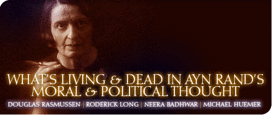The passage Doug quotes from Cicero is one of my favorites too, but it seems to be asserting my position rather than Doug’s. For it says that we should follow our individual nature only so far as it consists with virtue and/or the requirements of universal human nature; and Cicero would clearly agree (given the rest of De Officiis) that respect for the rights of others is part of universal virtue. One’s individual nature can make the requirements of human nature more specific, but it cannot contradict them. (In the text that follows Cicero goes on to specify that one’s social circumstances can add yet further specifications, but these are clearly subject to the same requirement.) So the fact that the human good is individualized differently for different people doesn’t entail that one person’s good can conflict fundamentally with another’s. So I don’t agree with Doug’s claim that the mere fact of individuality “does mean that there can be” such conflicts.
Of course, if Doug hasn’t shown that there can be, I also haven’t shown that there can’t be. Determining which aspects of morality belong to the universal nature and which to the individual, and in particular whether respect for rights belongs to the former or the latter, is a complicated business. But I do think that the close connection between our nature as rational beings and the need to deal with others through reason rather than force does speak in favor of locating respect for rights at a fairly deep level.
In response to Neera’s worries about choice situations that destroy our capacity for happiness, I think this would be a problem for the Aristotelian view if it held either that virtue is sufficient for happiness or that happiness consists solely in conscious occurrent feelings. But if happiness is a matter of the objective success of one’s life as a whole, then I don’t find it problematic to say that if we were to avoid suffering horrific injustice only by committing such injustice ourselves, our lives would be objectively even worse (though we might perhaps feel better). But here I suspect I am siding with Aristotle against Rand, who defines happiness as “a state of non-contradictory joy,” which doesn’t make it sound like a feeling (though one might be able to place some weight on the qualifier “non-contradictory”).
In answer to Mike’s question, here’s principally what I find plausible in “The Objectivist Ethics”: a) the idea that the self-sustaining nature of living organisms gives value-concepts a purchase in their case that it doesn’t have in the case of things that don’t do anything to maintain themselves in existence, and so can’t clearly be said to succeed or fail, or to be benefited or harmed; b) the further idea that once we recognize ourselves as one of these entities, we cannot without incoherence fail to endorse what is biologically good or bad for it/us; and c) the yet further idea that reflection on the nature of the particular sort of organism we are will form part of the argument both for governing our own lives by reason and for dealing with others by reason.
And that’s a fair bit. But I think to get to a full-fledged harmony of interests we need more than Rand gives us, and in particular we need to lay some stress on the social nature of reason, which is something Rand would not be jazzed about.
So in short, I’d say that Rand filled in some important bits of the picture, but not all of it, and indeed she explicitly rejected some pieces that I think are needed. But I’d say the same of Aristotle, or indeed of Kant.

